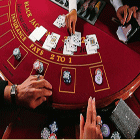我们称它为“大肥彩”(El Gordo (“the Fatty”) ),是因为它将在今年12月22号开出的超级巨额大头彩--23亿欧元(33亿美元)。西班牙的圣诞博彩之所以受到这样的重视,不仅仅因为其中的巨额奖金,还在于它精明的商业运作模式。
其实,西班牙人并不是非常喜欢赌博的。从某咨询公司“伦敦经济”(London Economics)2006年的一项研究来看,西班牙的人均博彩开销都比不上欧盟的平均水平。但是,他们每年在买彩票上花的钱达120亿欧元,占本国GDP的1%上,这样的一个比例,赶得上他们本国的研发资金。其中,大约有四分之三的人会参加圣诞节期间的那次开彩。
每年管理“大肥彩”和其他一些乐透的政府机构Loterías y Apuestas del Estado,通过将每张200欧的彩票分割成10小张,每小张售20欧的方式,鼓励国民的广泛参与。这样一来,参与者可以在更多大张彩票中购买数张小额股份,而这一般可通过与朋友同事合购的方式实现。除了头彩,它还设置了很多小额的奖励,使得参与者基本上每抽六次,都可以有所收获。
这一切使得博彩业由一种被美化了的向穷人征收的税收(多数国家都是这样的情况),变成了社会生活中的一元素。“在圣诞节和别人凑份子买彩票已经成了强化社会关系的纽带。”乔治敦大学(Georgetown University)的做客教授Roberto Garvía这样说。凑份子的做法最初起源于19世纪,因为在那个时候,对于工人阶层来说彩票是非常贵的,单个人很难买得起。后来,这个传统就在各个阶层就传下来了。正如某个崽银行职员说的:“我可不想成为那个全办公室人都中奖了,却得继续一个人埋头工作的傻蛋。”
最大的赢家是西班牙政府,它们从彩票销售收入中可以获得30%的收益,还不包括运营成本。“但是也没必要觉得被剥削了”,沃顿商学院的Mr Garvía和Mauro Guillén说。他们曾经和“前进基金会”(Fundación March)的Andrés Santana一起研究过博彩业中凑份子现象。他们对这样的现象表达自己的看法:“数据显示,在圣诞节期间,凑份子的做法会吸引更多相对富有的人购买彩票,这就使得它更像是一个累积税。”
译文:
How an original business model got Spaniards hooked
IT IS called El Gordo (“the Fatty”) because of the huge amount it pays out: 2.3 billion ($3.3 billion) in this year’s draw, to be held on December 22nd. Yet Spain’s Christmas lottery is notable not just for the vast sums to be won, but also for its clever business model.
Spaniards are not especially big gamblers, with spending per head below the average for the European Union, according to a 2006 study by London Economics, a consultancy. Yet they spend about *12 billion a year on lottery tickets, over 1% of GDP-almost as much as the country spends on research and development. Roughly three-quarters of them participate in the Christmas lottery.
Loterías y Apuestas del Estado, the government agency that runs El Gordo and other lotteries during the year, encourages mass participation by dividing each *200 ticket into décimos, or tenths, which sell for *20. This, in turn, allows players to improve their odds by buying small shares in many tickets, often by forming syndicates with friends and colleagues. The lottery also offers enough smaller prizes in addition to its jackpots to give participants almost a one-in-six chance of winning something.
All this has transformed the lottery from a glorified tax on the poor, as it is in most countries, into part of the social fabric. Sharing tickets at Christmas has become a way to reinforce social ties, says Roberto Garvía, a visiting professor at Georgetown University. The practice of forming syndicates, which initially started in the 19th century when lottery tickets became too expensive for working-class folk, has become a tradition among all classes. As one banker says, “I don’t want to be the only idiot who has to turn up to work if the office number wins.” Even the Spanish Civil War did not succeed in shaking the lottery’s grip: each side held its own Christmas draw.
The biggest winner is the Spanish government, which receives 30% of the revenue from ticket sales, less the running costs. But it need not feel too exploitative, argue Mr Garvía and Mauro Guillén of the Wharton School of Business, who have studied lottery syndicates along with Andrés Santana of the Fundación March: “There is some evidence that at Christmas time, syndicates lure into the lottery the relatively wealthy, which might make it less regressive.”



 玩二十一点游戏赚钱的
玩二十一点游戏赚钱的 独家秘传网上百家乐怎
独家秘传网上百家乐怎 四人斗地主技巧决定胜
四人斗地主技巧决定胜 外国在线真钱骰宝娱乐
外国在线真钱骰宝娱乐


